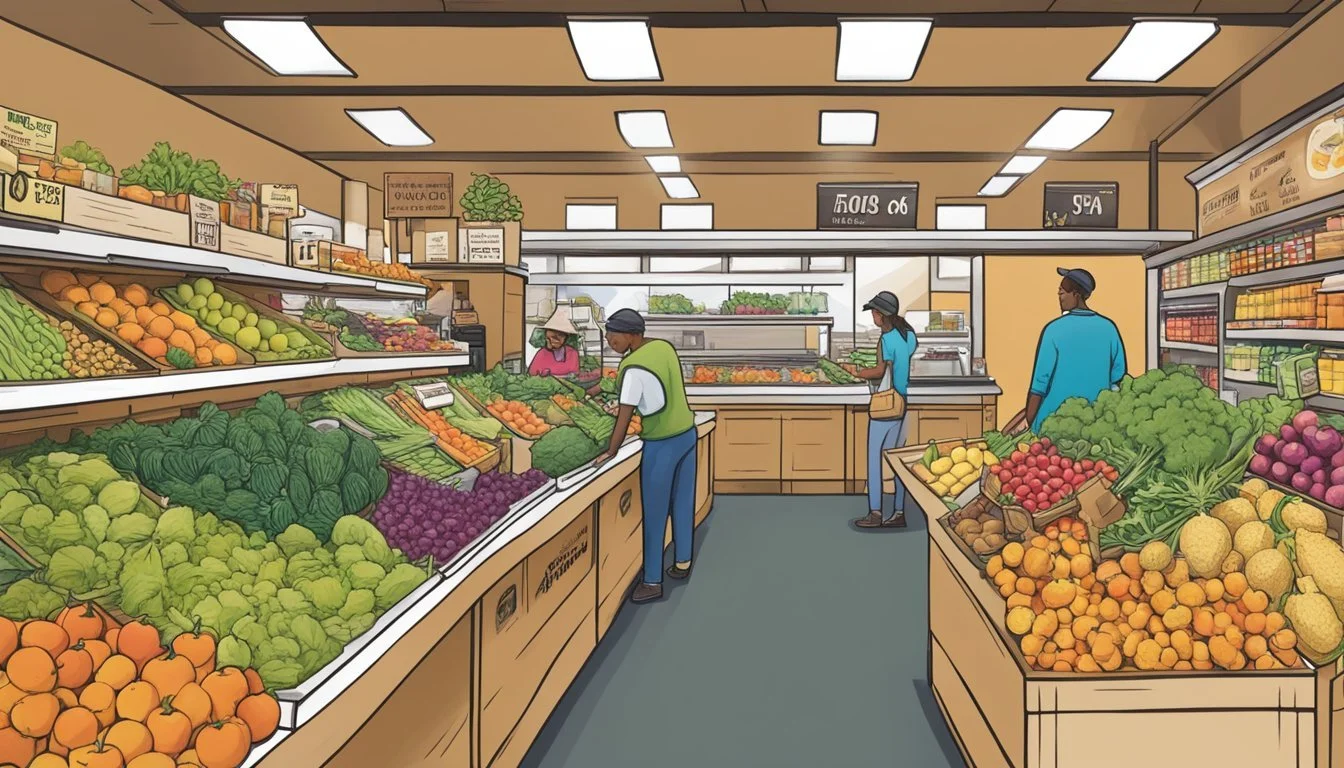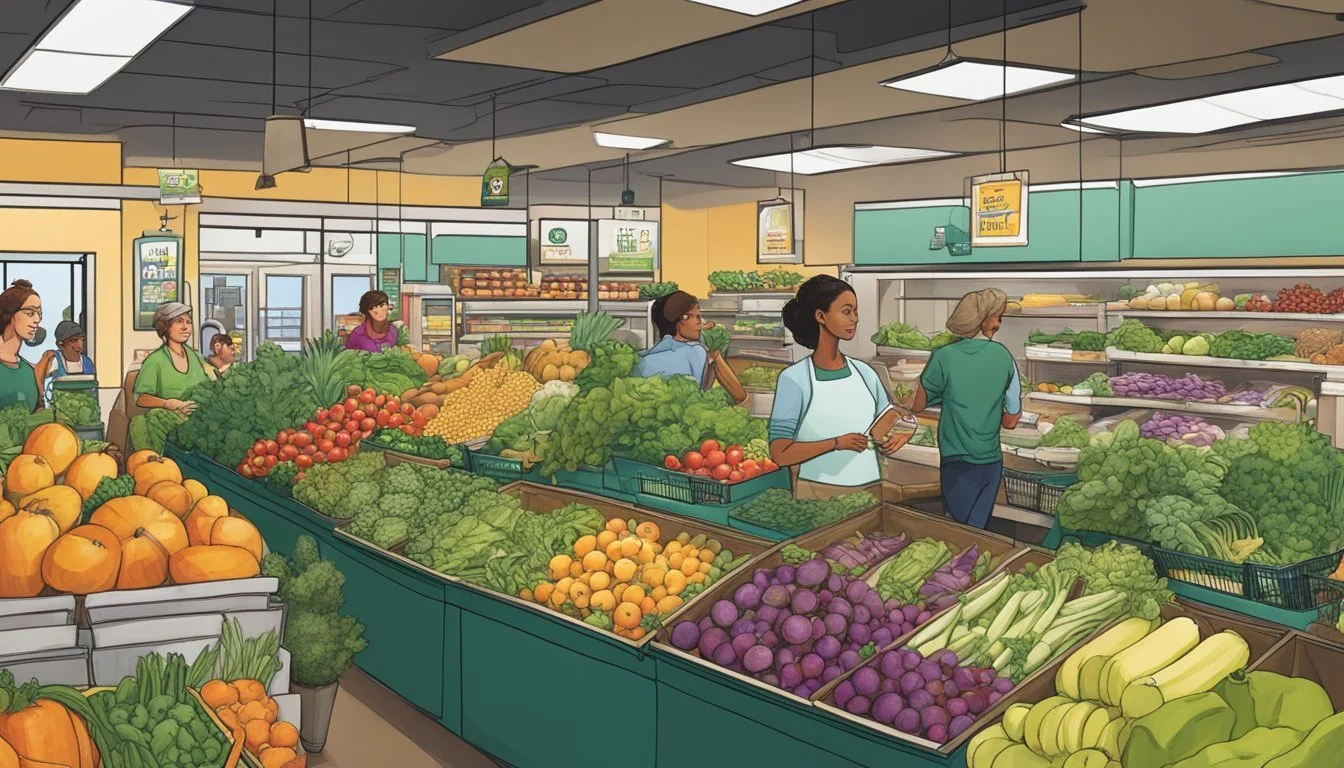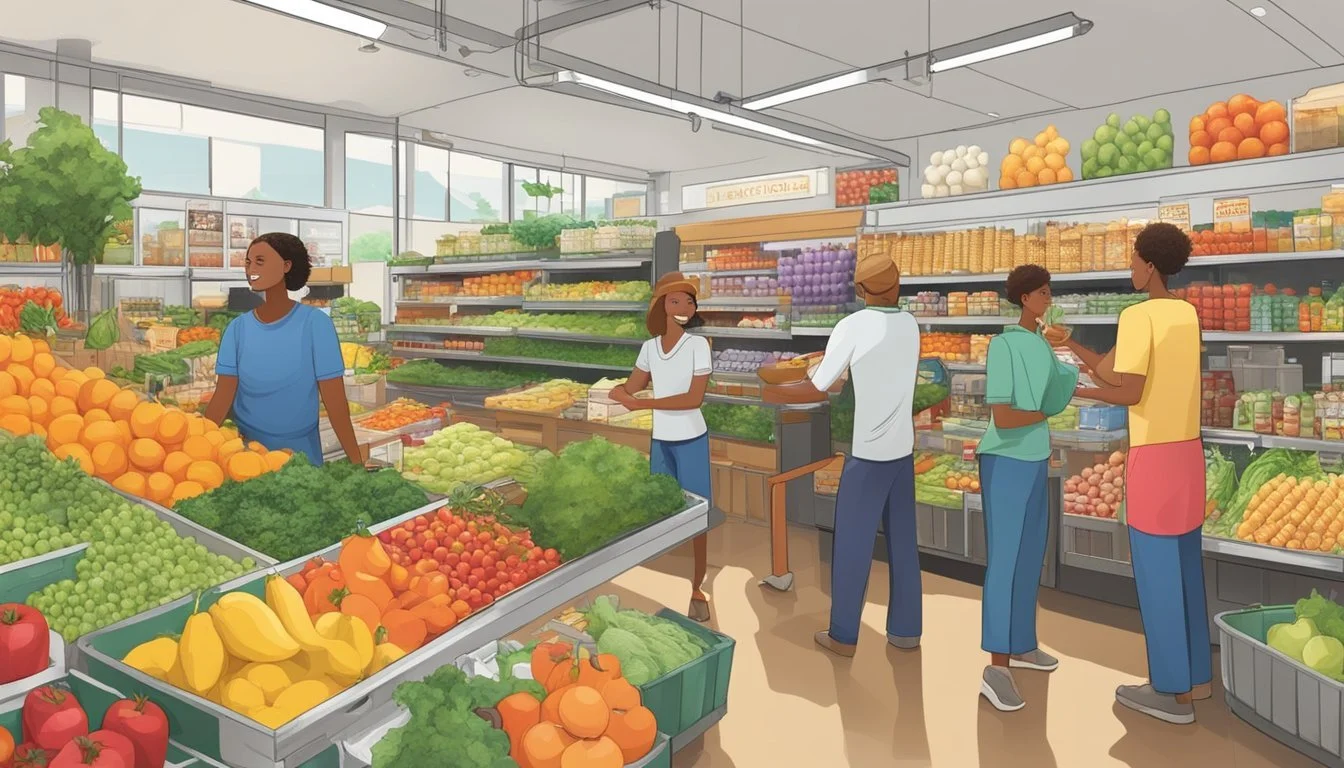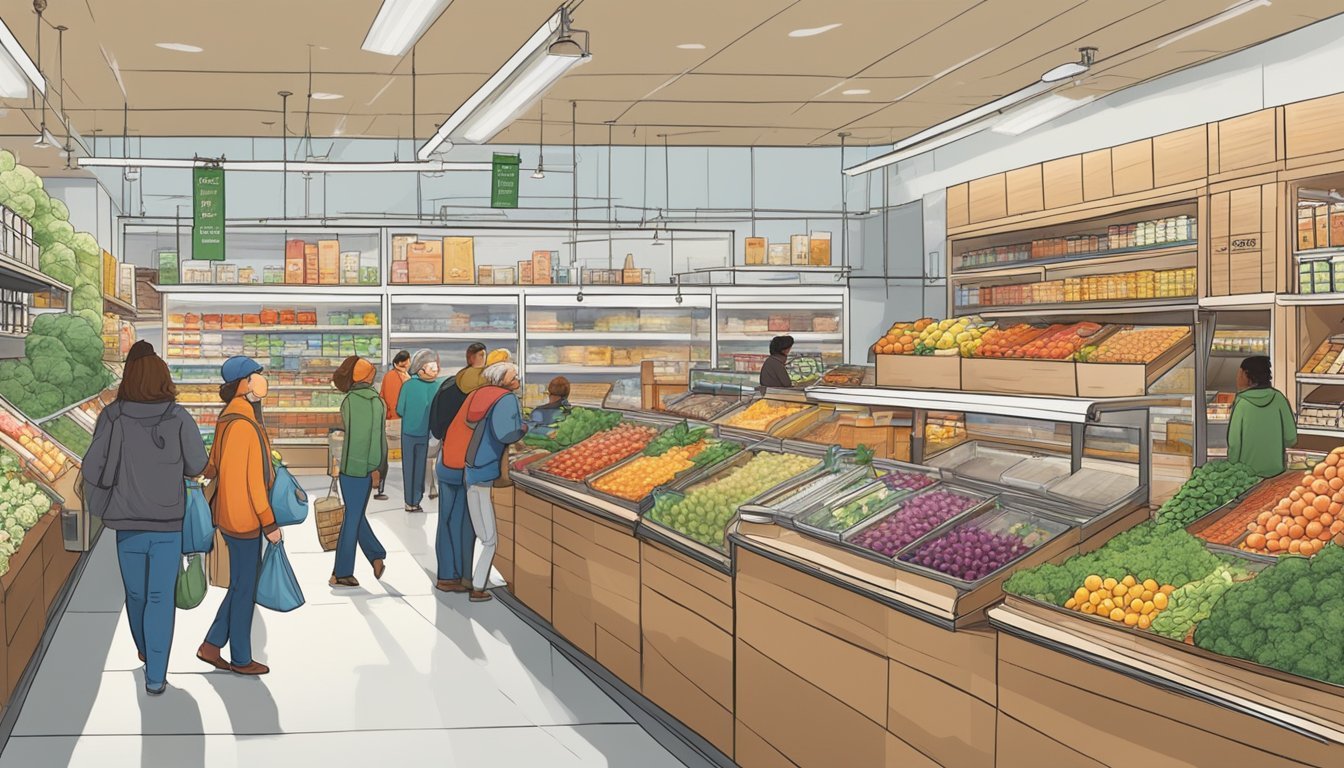Guide to Food Co-Ops in Saint Paul, MN
Your Local Shopping Guide
Saint Paul, Minnesota, is a city with a strong sense of community that extends to its food culture. Food cooperatives, or food co-ops, are an integral part of this community fabric, offering residents access to locally sourced, organic, and sustainable produce and goods. Unlike traditional grocery stores, co-ops are member-owned and democratically operated, meaning that they reflect the needs and values of their members. They often focus on building local economies, fostering local agriculture, and providing education about health and nutrition.
In Saint Paul, the presence of food co-ops like Mississippi Market is notable. This co-op has become a staple for residents who value real food and real farmers. Mississippi Market emphasizes community involvement and supports local farmers and producers, which enriches the local food system. Furthermore, co-ops such as Hampden Park Co-Op offer a wide variety of grocery items and have cultivated a loyal customer base due to their commitment to quality products and exceptional customer experiences.
The impact of food co-ops on Saint Paul goes beyond the food they sell. They serve as community hubs, where residents can connect with one another and with the sources of their food. Educative events, local food programs, and a focus on sustainable practices reflect a broader, community-oriented approach to groceries. For anyone looking to deepen their understanding of Saint Paul's local food scene, exploring its food co-ops offers insights into a more cooperative, sustainable way of living and consuming.
Understanding Food Co-Ops
Food co-ops in Saint Paul, MN play a critical role in fostering local economies, promoting sustainable food systems, and offering democratic ownership to their members. Their emphasis on community well-being and support for local producers sets them apart from traditional grocery retailers.
What Is a Co-Op?
A cooperative, or co-op, is a business entity that is owned and democratically controlled by its members, who are also the consumers. Co-ops operate on a principle of voluntary and open membership, welcoming anyone able to use their services and willing to accept the responsibilities of membership.
Cooperative Principles
Cooperatives are guided by seven key principles:
Voluntary and Open Membership: Co-ops are open to all individuals without gender, social, racial, political, or religious discrimination.
Democratic Member Control: Cooperatives are democratic organizations controlled by their members—one member, one vote.
Member Economic Participation: Members contribute equitably to, and democratically control, the capital of the cooperative.
Autonomy and Independence: Co-ops are autonomous, self-help organizations controlled by their members.
Education, Training, and Information: Co-ops provide education and training for members to contribute effectively to the development of their cooperatives.
Cooperation Among Cooperatives: By working together, co-ops serve their members most effectively and strengthen the cooperative movement.
Concern for Community: Co-ops work for the sustainable development of their communities.
Benefits of Joining a Co-Op
Members of a food co-op often enjoy several benefits:
Local Economic Support: By purchasing from local farms and producers, co-ops support local economies.
Quality and Sustainability: Co-ops frequently offer organic and sustainably produced goods, focusing on health and environmental responsibility.
Democratic Influence: Members have a voice in the operation and governance of the co-op.
Community Building: Co-ops foster a sense of community and shared purpose, connecting members with local producers and consumers.
Food Co-Ops in Saint Paul
Saint Paul, MN is home to several thriving food cooperatives that emphasize community ownership and natural food selections. These co-ops are revered for their quality produce and commitment to sustainable practices.
Mississippi Market
Mississippi Market is a consumer-owned cooperative in Saint Paul. Pioneering the food co-op scene, it is known for its high-quality organic and locally-sourced food. Shoppers can trust they are supporting ethical food distribution and local farmers when they shop here.
Seward Community Co-Op
Another crucial player is the Seward Community Co-Op. With a focus on community engagement, Seward offers a diverse range of local, organic food choices. This cooperative plays a significant role in educating consumers about eco-friendly food options and the benefits of community-supported agriculture.
Wedge Community Co-Op
Wedge Community Co-Op marks its presence with a strong commitment to organic produce and sustainable food systems. The co-op features an array of natural and locally-produced goods, cementing its status as a cornerstone of the Saint Paul community for those looking to make conscious food choices.
Membership and Ownership
Becoming a member or an owner of a food co-op in Saint Paul, Minnesota is a step toward investing in a sustainable food system and community well-being. Members gain access to various benefits, while ownership shares reflect a financial stake in the co-op.
How to Join
To join a food co-op, an individual typically fills out an application and pays a membership fee. For instance, at Mississippi Market, anyone can shop, but membership entails providing a financial contribution to become a co-owner. Prospective members can usually sign up in-store or online, furnishing personal details and acknowledging their agreement with the co-op’s principles.
Membership Benefits
Members of a food co-op enjoy several advantages, such as:
Discounts: Special prices on select products.
Community Support: Being part of a movement that values local food economy and sustainable practices.
Engagement: The opportunity to vote on important matters and possibly participate in governance.
Mississippi Market, among other co-ops, offers these types of benefits as part of its membership package.
Ownership Shares
Ownership in a co-op is often represented by shares. These shares do not earn dividends like traditional stock but may offer financial benefits such as patronage refunds based on the co-op’s performance and individual use. Ownership shares require a one-time investment, which can sometimes be paid in installments, granting the owner a stake in the co-op's future.
Educational Opportunities
Food co-ops in Saint Paul, MN, provide unique educational opportunities for community members interested in learning about organic foods, healthy eating habits, and sustainability practices. These co-ops facilitate classes and workshops and organize community events to promote knowledge and skills pertaining to certified organic products and food-related education.
Classes and Workshops
Saint Paul's food co-ops offer a variety of educational classes and workshops aimed at enhancing community members' understanding of organic and healthy food choices. Classes may cover a range of topics, from the basics of cooking with organic ingredients to the intricacies of dietary needs and nutrition. Workshops are typically hands-on, allowing participants to directly engage with food preparation and learn sustainable cooking techniques.
Topics Covered:
Cooking with organic ingredients
Nutrition and dietary planning
Sustainable food practices
Community Events
Community events at the co-ops serve as platforms for bringing together individuals to discuss and learn about food sustainability, organic agriculture, and healthy lifestyles. These events often include discussions, educational booths, and collaborations with local schools to further outreach on the importance of certified organic products. Participation in community events helps reinforce the co-op’s dedication to education and concern for community well-being.
Types of Community Events:
Educational discussions and Q&A sessions
School outreach programs
Collaborative events with local farmers and producers
Sourcing and Products
Saint Paul, Minnesota's food co-ops are dedicated to strengthening local economies and providing consumers with high-quality, sustainably sourced products. They commit to transparency in sourcing and offer an array of organic and natural foods.
Local Farm Partnerships
Food co-ops in Saint Paul place a significant emphasis on local farm partnerships. On average, a food co-op sources from 281 local farms and producers, bolstering the local food system. These alliances ensure customers have access to fresh, local products and contribute to the vitality of the regional agricultural community. Important aspects of these partnerships include the support of:
Fair trade practices
Promotion of good food originating within the community
Strengthening the local economy by keeping consumer dollars within the state
The impact of these partnerships transcends the economic sphere, fostering a stronger connection between consumers and the origins of their food.
Organic and Natural Foods
The commitment to organic and natural foods is paramount within Saint Paul's co-ops. They consistently offer a diverse range of certified organic products, ensuring options are available across various food categories:
Fresh produce
Meats
Dairy products and poultry
Moreover, these food co-ops are education centers for consumers seeking information about the benefits of organic food and natural food products. They highlight the ethical and health considerations of organic farming and its positive impacts on the environment.
Store Features
Food co-ops in Saint Paul offer a unique blend of community-driven ethos and high-quality product offerings. They emphasize organic and locally-sourced produce while facilitating a cooperative relationship between consumers and retailers.
Amenities and Services
Most food co-ops in Saint Paul provide a diverse range of amenities and services that cater to health-conscious and eco-friendly shoppers. Typically, customers can expect:
Bulk Food Sections: Extensive selections of grains, nuts, spices, and other bulk items to reduce packaging waste.
Deli and Bakery: In-house preparation of fresh deli items and bakery goods, often using ingredients that are organic or sourced from local farmers.
Curbside Pickup: Services that enable convenient shopping without leaving the car, reflecting an adaptation to modern consumer needs.
Health and Wellness Products: Shelves stocked with natural and holistic wellness products for consumers looking to complement their healthy diets.
Community Events: Workshops and events designed to engage and educate members on various topics related to food and sustainability.
Store Locations
The food co-ops in Saint Paul are strategically located to serve both the city and the broader Twin Cities metro area. Notable locations include:
Mississippi Market: With multiple outlets, they are a fixture in Saint Paul, providing access to a wide range of local, organic, and non-GMO products.
740 East 7th Street, Saint Paul, MN 55106
Open Daily: 7:30 a.m. - 9 p.m.
Phone: 651-495-5602
Hampden Park Co-op: Hampden Park has been a part of the Saint Paul community since the '70s and offers a cozy, neighborhood-oriented shopping atmosphere.
928 Raymond Avenue, Saint Paul, MN 55114
Phone: (651) 646-6686
Both Mississippi Market and Hampden Park Co-op serve their respective neighborhoods and the larger Twin Cities area, including Minneapolis, reflecting an intentional effort to reach a broad customer base concerned with food origin and quality.
Supporting the Co-Op Movement
Food co-ops in Saint Paul are more than just grocery stores; they are a testament to a movement deeply rooted in cooperative values and community impact. They exemplify a commitment to not only offer quality food but also to uphold traditions and principles that foster a stronger, united community.
Cooperative Values and Mission
Food co-ops in Saint Paul operate on a set of core values that define their mission. They are centered around democracy, equity, equality, and solidarity. Members have a say in the decision-making processes, emphasizing the importance of each voice in steering the cooperative's direction. These values manifest in the mission to provide access to healthy food and support for local producers, thus sustaining the local economy.
Community Involvement and Impact
The impact of food co-ops on the Saint Paul community is significant. Co-ops often lead initiatives for social and environmental change, engaging members and the broader community. They organize educational programs to spread awareness on nutritional health, sustainable agriculture, and the importance of fair trade. Such involvement ensures that the co-ops' influence extends beyond economic activity, solidifying their role as pillars of local tradition and advocates of cooperative principles.
Pricing and Affordability
In Saint Paul, Minnesota, food co-ops are known for offering a variety of quality products, focusing chiefly on organic stores and fresh produce. These natural food co-ops take pride in providing consumers with sustainable and locally sourced options. Regarding prices, shoppers may notice a slight premium compared to conventional supermarkets due to the co-ops' emphasis on organic and responsibly-sourced products.
Affordability Factors:
Organic Premium: Organic items generally carry a higher price due to more costly farming practices and certification processes.
Local Sourcing: Products from local farms may have less transportation overhead, but small-scale operations can lead to higher costs.
While some consumers may perceive natural food co-ops as more expensive, the co-ops often offer competitive pricing for the quality and ethical sourcing they ensure. Members of co-ops may also receive discounts and benefits, making shopping more affordable.
Shopper Tip: To manage costs, consider becoming a co-op member. Membership can offer savings through discounts and special prices.
Seasonal Pricing:
Spring/Summer: Prices for local produce may decrease as the availability increases.
Fall/Winter: Expect some seasonal items to carry a higher price due to scarcity or increased sourcing challenges.
Food co-ops in Saint Paul strive to balance affordability with the high standards of their product offerings. They exemplify value through their commitment to the local economy and fostering a healthier community.
Sustainability and Environmental Impact
Saint Paul, Minnesota's food co-operatives (co-ops) are central to fostering a sustainable food system in the region. These co-ops are committed to selling organic foods and supporting sustainable agricultural practices, which benefit both people and the environment.
Organic Foods Food co-ops in Saint Paul make it a priority to stock a range of organic options. These foods are grown without synthetic pesticides and fertilizers, promoting healthier soil and water quality.
Local Impact
On average, each member food co-op works with approximately 281 local farms and producers.
They significantly contribute to the local economy by selling an estimated $5.6 million worth of local products annually.
Environmental Initiatives Food co-ops collectively aim to have a positive impact on the environment by implementing green practices such as:
Waste reduction
Energy efficiency
Eco-friendly packaging
By focusing on environmental stewardship, food co-ops in Saint Paul demonstrate their dedication to a greener, more sustainable future. These practices ensure that the communities not only have access to nutritious and fresh local produce but also contribute to a healthier planet.











